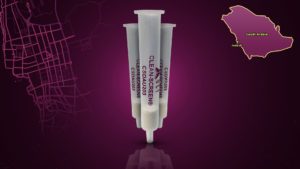Testing of drugs using human feto-maternal interface organ-on-chips provide insights into pharmacokinetics and efficacy
There are a very limited number of medical interventions to prevent placental-mediated adverse pregnancy outcomes, such as preterm birth (PTB) and no interventions available for pre-eclampsia (PE). This is because pharmaceuticals are unable to cross feto-maternal interface (FMi) barriers and there is lack of proper models to test drug interactions, teratogenicity, and cytotoxicity at those same interfaces. Not to mention, the current models are cost-prohibitive, do not replicate normal pregnancy physiology or only test one of the two interfaces that are found at FMis. To combat these problems, a collaborative research group based out of Texas A&M University turned to a microfluidic Organ-On-Chip (OOC) design. Using UCT’s (tridecafluoro-1,1,2,2 tetrahydrooctyl) trichlorosilane (T2492) to facilitate mold release, this design is comprised of four interconnected culture compartments, one for maternal cells and three for fetal cells, thus creating a model that contains four different microenvironments that can intercommunicate during culture. Using this model, they were able to demonstrate that the fetal membranes, previously ignored, can express transporter proteins and other important enzymes, making this membrane important for drug transport, indicating that this model’s membranes are able to mimic real placental drug transport. This OOC model shows greater ability to test drug transport effectiveness across FMi than previous models and can corroborate data obtained using in silico or in vivo methods. To improve upon this model, researchers are working to incorporate dynamic flow for more accurate assessments of pharmacokinetics. This device could also be widely adapted to model any trimester, different cell types and ratios, as well as the amount of oxygen in the environments, thus allowing for an extremely diverse fetal drug interaction model.
Citation: Richardson, L. S.; Kammala, A. K.; Costantine, M. M.; Fortunato, S. J.; Radnaa, E.; Kim, S.; Taylor, R. N.; Han, A.; Menon, R., Testing of drugs using human feto-maternal interface organ-on-chips provide insights into pharmacokinetics and efficacy, Lab Chip, 2022, 22, 4574-4592.
https://pubs.rsc.org/en/content/articlelanding/2022/lc/d2lc00691j (Open Access)







